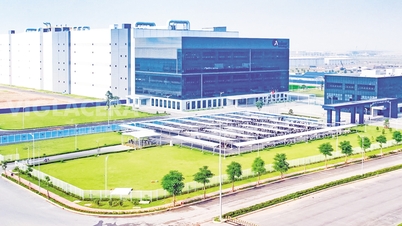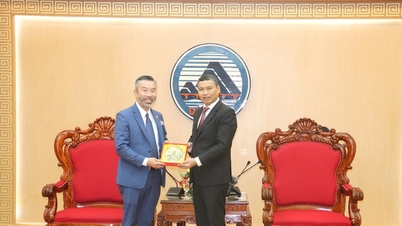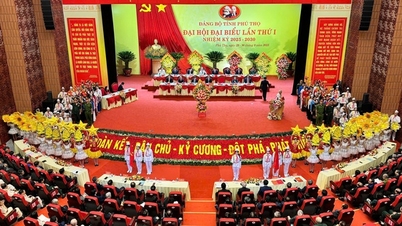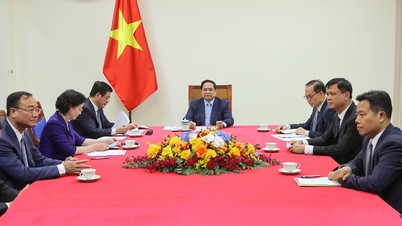China's Ministry of Commerce said on July 3 that two minerals, gallium and germanium, along with more than 30 related metals and other materials (key raw materials for the production of semiconductors and electronic devices), will be subject to export controls starting August 1.
Export controls on gallium and germanium-related items are necessary “to safeguard national security and interests,” according to China’s Ministry of Commerce.
Exporters will have to apply for a license from the commerce ministry if they want to start or continue shipping goods abroad and will have to report details of their overseas customers, as well as how the metals are used.
Additionally, exports of items with significant national security impacts listed in the ministry's notice will require approval from the State Council, China's cabinet.
"Own goal"
The new restrictions on gallium and germanium affect specialty metals that are produced and refined primarily in China, giving the country leverage in a number of advanced sectors. Neither metal is traded in large quantities, but both have important applications in specific industries, notably semiconductor manufacturing.
Both gallium and germanium appear among the 50 minerals that the US Geological Survey considers “critical,” meaning they are essential to the US economy or national security and have supply chains vulnerable to disruption.
China is the world's top producer of gallium and germanium, so any reduction in its output could potentially slow production or raise prices for manufacturers and their customers in the technology, telecommunications, energy and automotive sectors, according to the agency.

Gallium is used in compound semiconductors, which help devices run faster with lower power consumption. The metal is also used in military equipment, like germanium. Photo: Financial Times
However, these metals are not particularly rare or difficult to find, although China is selling them cheaply while the cost of mining them is relatively high. Both metals are byproducts of processing other commodities such as coal and bauxite (essential for making aluminum). As limited supplies push up prices, producing these metals elsewhere is not too difficult.
“When they stopped cutting prices, it suddenly became more viable to mine these metals in the West, and China scored an own goal,” said Christopher Ecclestone, a strategist at New York-based investment bank Hallgarten & Co.
“For a short period they will be more expensive, but then China will lose its market dominance. The same thing has happened before with other things like antimony, tungsten and rare earths,” Mr. Ecclestone said.
Some Chinese companies are also concerned that the export controls could backfire. “It may hurt the business of Chinese manufacturers during the economic downturn, but the impact on the international market in the short term is limited,” said a manager at a Chinese semiconductor company.
"Tit for tat"
China's decision comes after the Netherlands announced new export controls on advanced chipmaking equipment on June 30, adding fuel to Washington's efforts to curb China's chipmaking capabilities.
Dutch companies including ASML - one of the world's most important semiconductor machinery makers - will need to apply for licenses to export some advanced semiconductor manufacturing equipment abroad.
The Netherlands' controls, nominally a "neutral country", will come into effect from September 1.
The Dutch announcement came shortly after media reports that the US was considering new restrictions to prevent leading chip companies such as Nvidia and AMD from exporting artificial intelligence (AI) chips to China.
China said this was “an abuse of export control measures and a serious violation of free trade and international trade rules”.

US-China trade tensions, especially in the semiconductor sector, are expected to be the focus of US Treasury Secretary Janet Yellen's upcoming visit to China. Photo: NY Times
Beijing's clearest response to attacks on its tech sector so far was its move in May to ban the use of US memory chipmaker Micron's products in "critical national infrastructure," citing security risks.
China is fighting for technological dominance in everything from quantum computing to artificial intelligence to chipmaking. The US has taken increasingly tough measures to prevent China from gaining the upper hand, and is urging allies in Europe and Asia to do the same.
Before the Netherlands, Japan also added 23 to the list of products requiring export licenses, except for exports to 42 countries and territories identified as "friendly".
Trade tensions between China and the United States have been escalating, with each side increasingly imposing export restrictions aimed at slowing the other's high-tech industries.
These measures have been a major topic in high-level talks between the two governments and are likely to be discussed by US Treasury Secretary Janet Yellen during her visit to Beijing this week .
Nguyen Tuyet (According to WSJ, Bloomberg, SCMP, Financial Times)
Source


![[Photo] Many streets in Hanoi were flooded due to the effects of storm Bualoi](https://vphoto.vietnam.vn/thumb/1200x675/vietnam/resource/IMAGE/2025/9/29/18b658aa0fa2495c927ade4bbe0096df)
![[Photo] General Secretary To Lam, Secretary of the Central Military Commission attends the 12th Party Congress of the Army](https://vphoto.vietnam.vn/thumb/1200x675/vietnam/resource/IMAGE/2025/9/30/9b63aaa37ddb472ead84e3870a8ae825)


![[Photo] General Secretary To Lam receives US Ambassador to Vietnam Marc Knapper](https://vphoto.vietnam.vn/thumb/1200x675/vietnam/resource/IMAGE/2025/9/29/c8fd0761aa184da7814aee57d87c49b3)
![[Photo] General Secretary To Lam attends the ceremony to celebrate the 80th anniversary of the post and telecommunications sector and the 66th anniversary of the science and technology sector.](https://vphoto.vietnam.vn/thumb/1200x675/vietnam/resource/IMAGE/2025/9/29/8e86b39b8fe44121a2b14a031f4cef46)




























![[Photo] National Assembly Chairman Tran Thanh Man chairs the 8th Conference of full-time National Assembly deputies](https://vphoto.vietnam.vn/thumb/1200x675/vietnam/resource/IMAGE/2025/9/29/2c21459bc38d44ffaacd679ab9a0477c)

































































Comment (0)